
Inside WSP in Canada: A Journey of Leadership and Innovation with Amir Abd El-Halim
As National Engineering Month continues, we’re meeting and profiling some of the province’s engineering leaders.
Recently we met with Amir Abd El-Halim, Regional Executive Vice President, Ontario & Atlantic at WSP in Canada. With a rich background spanning over two decades, Amir’s journey in engineering mirrors the dynamic evolution of the profession itself. From his early days in environmental engineering to his current role in shaping strategic initiatives on a regional scale, Amir’s story is a testament to the ever-changing landscape of engineering and the enduring importance of adaptability and innovation.
Tell me a bit about yourself & your background.
I’ve been in the business since 2002, accumulating over 20 years of experience. I started my career as an environmental engineer, completing my undergrad in environmental engineering at Carleton University in 2002.
In 2003, I relocated from Ottawa to the Greater Toronto Area (GTA) and completed my master’s degree part-time while starting my career in consulting engineering at Trow Associates, now EXP. In early 2004, I moved to Waterloo Region and joined Stantec, another consulting engineering firm, while I pursued a PhD at the University of Waterloo to follow in my father’s footsteps as a civil engineering professor. However, I unexpectedly fell in love with consulting, progressing from technical roles to business operations and strategy. Now, in my current role at WSP in Canada, I am responsible for driving growth and strategy in Ontario and Atlantic Canada, which is something I never imagined I would be doing when I started my career working in an asphalt lab back in 2003. I feel immensely grateful for the opportunities and experiences that have shaped my career.
Why is National Engineering Month important to you and the engineering profession overall?
Engineers aren’t ones to boast, and we’re not particularly great at self-promotion. Nevertheless, we carry out significant work that benefits the public, society, and communities. Whether it’s transiting through rails or roads, accessing clean water, or seeking medical care, we often take these essentials for granted. As engineers, we understand the value of our contributions to society, but it’s often underestimated by the general public. Therefore, initiatives that highlight and celebrate the importance of engineering and emphasize our contributions are crucial.
The theme for NEM 2024 is lifelong learning. What does the concept of lifelong learning mean to you? Why is lifelong learning important in the work that you do?
Learning is something that never stops. I started my undergrad 26 years ago, and even now, after all this time, I’m still learning. Our industry operates in a dynamic environment where technology, innovation, resilience, and sustainability are constantly evolving. It’s crucial to continually learn, whether through formal training, on-the-job experience, attending conferences, participating in industry boards, or networking with peers. Without ongoing learning, we can’t guarantee that we’ll possess the necessary skill sets to execute projects and provide solutions for tomorrow’s challenges. It may sound cliché, but learning truly is a lifelong journey. I’ve been fortunate to have great mentors throughout my career, learning from experienced leaders, engineers, administrators, and scientists. As leaders in our companies, it’s essential to provide learning opportunities at all levels and ensure inclusivity, while also giving back to those who have contributed to our growth.
Can you tell me a little more about WSP in Canada and the types of projects you work on?
WSP is a global leader in professional services, offering strategic advisory, engineering, and design solutions. With over 67,000 talented professionals worldwide, including more than 12,000 in Canada, we have a strong presence nationally. In Ontario alone, we employ over 4,500 staff, and our Canadian offices span over 100 cities, covering coast to coast and territories. Our Canadian roots are a source of pride, with our Global head office located in downtown Montreal. We provide services across four major industry sectors: Transportation and Infrastructure, Earth and Environment, Property and Buildings, and Energy, Resources, Industry. We’re globally recognized as an industry leader for ESG programs, and we are currently engaged in 74 of Canada’s top 100 public sector infrastructure mega projects, making us the leading company in the country. Some notable projects include the Parliamentary Precinct Rehabilitation Project in Ottawa, the expansion of the Gold Transit network in the Greater Toronto area, the Gordie Howe International Bridge, and the new Calgary Green Line project in Calgary. With our involvement in numerous projects spanning various sectors nationwide, we are committed to delivering excellence across Canada.
How has the engineering profession changed over the past 5 to 10 years & how is WSP in Canada capitalizing on those changes?
If we compare where we are today to maybe 20 years ago, concepts like sustainability and corporate stewardship have become significantly more important. It’s not just about meeting the minimum requirements; it’s about being a positive corporate ambassador and considering the impact of our actions on our communities, society, and future generations. Back when I started in 2003, fax machines were still a common tool for communication, but now, with advancements in technology like AI and digital transformation, we’re exploring new ways to enhance efficiency and creativity in our work. For instance, 3D tools allow us to visualize designs in virtual reality, providing a more immersive experience for both clients and the public. Overall, embracing technology and prioritizing initiatives beyond the minimum requirements are key factors shaping the engineering landscape today.
Are there any specific programs, initiatives, or outcomes happening at WSP in Canada that you’d like to tell me about?
One of the things that I’m proud of at WSP in Canada, is our very strong network of employee resource groups (ERGs). We have ERGs for developing professionals (DPN), Indigenous and First Nations folks (CIRCLE), the LGBTQ2+ community (VIBE), Black Professionals (BPPN), and Women of WSP (WOW). These groups are all grassroots initiatives, meaning they’re not imposed from the top down but are empowered by individuals within the organization who build teams and are provided with an executive sponsor. As the executive sponsor for BPPN (Black People’s Professional Network), my role is to support them in elevating their voice and ensuring the community feels valued and connected within the organization. These initiatives are aligned with our corporate goals and serve as a differentiator for us in the eyes of potential employees. It’s not just about the salary and benefits anymore; people want to know that they’re joining a company where they can connect, feel included, and make a difference beyond their technical work. I’ve worked in various firms, and what we do here with these programs is truly world-class and something we should all be immensely proud of.
What does the future of engineering look like and how does WSP in Canada fit into that?
At WSP in Canada, we have this internal vision or mission statement about being Future Ready®. Whether it’s infrastructure design, such as highways, hospitals, mining, water purification plants, or projects like the large battery plant we’re designing in St. Thomas for electric cars, we’re not just focused on the minimum requirements. We’re considering the impact 50 or 100 years from now and how it will affect local communities. We’re exploring ways to future-proof projects through resilience and innovative materials to lower maintenance costs and provide more value to our clients beyond mere compliance. Technology, particularly AI and machine learning, will have a big impact on the industry, and companies that don’t embrace it may fall behind. When I was in school, AI wasn’t even on the radar, but now it’s becoming essential knowledge for engineering graduates. Looking ahead, I believe AI and digital transformation are here to stay, so for current students, focusing on these high-tech streams could greatly enhance their value and opportunities in the field.
Another prominent industry trend we’re hearing about from clients is the energy transition. There’s a significant movement towards decarbonization due to concerns about climate change, prompting many clients to prioritize cleaner energy sources like nuclear, Hydro, and solar power. This shift towards cleaner energy will likely continue to be a major focus in the industry, offering opportunities for those interested in making a meaningful impact and finding impactful job opportunities in forward-looking areas.
Any final thoughts?
As consultants working in the field, we’re a people company, and for WSP in Canada, our people are what makes us who we are. I truly believe that taking care of our people – ensuring their safety, providing tools and resources, treating them well, paying them fairly, fostering an inclusive environment, and empowering them, leads to success. Conversely, neglecting these aspects can lead to failure because we are fundamentally a people business. It’s crucial to prioritize treating our people well, as this ultimately determines the success of our business.
Learn. Grow. Thrive. Together.
National Engineering Month is Ontario’s platform for celebrating the remarkable world of engineering. With a dynamic mix of insightful discussions, industry expertise, and diverse viewpoints, we’re showcasing the best of the profession. Join us in advancing engineering excellence, igniting interest in future professionals, and recognizing the vital role engineers play in society. Be a part of the #NEM2024 experience by attending an event. Explore all the exciting details at nemontario.ca.


